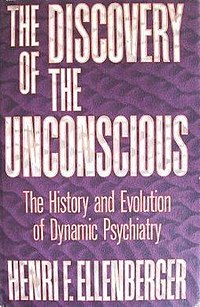The Discovery of the Unconscious

Cover of the first edition
|
|
| Author | Henri F. Ellenberger |
|---|---|
| Country | United States |
| Language | English |
| Subject | Psychiatry, psychology |
| Published | 1970 (Basic Books) |
| Media type | Print (Hardback and Paperback) |
| Pages | 932 |
| ISBN | |
| OCLC | 68543 |
The Discovery of the Unconscious: The History and Evolution of Dynamic Psychiatry is a 1970 book by the Swiss medical historian Henri F. Ellenberger. In this study of the history of dynamic psychiatry, Ellenberger provides an account of the early history of psychology covering such figures as Franz Anton Mesmer, Sigmund Freud, Carl Jung, Alfred Adler, and Pierre Janet. The work has become a classic, and has been credited with demolishing the myth of Freud's originality and encouraging scholars to question the scientific validity of psychoanalysis. Critics have questioned the reliability of some of Ellenberger's judgments.
The Discovery of the Unconscious is a study of the history of dynamic psychiatry that covers the early history of psychology and the work of Freud, Jung, Adler, and Janet. Ellenberger's chapter on Adler uses unpublished materials, including "Kindheit und Jugend Alfred Adlers bis zum Kontakt mit Sigmund Freud", a manuscript by the Adler researcher Hans Beckh-Widmanstetter. Ellenberger shows that Freud was dependent on earlier writers, especially Janet. He describes psychoanalysis and analytical psychology as forms of hermeneutics (the art or science of interpretation), comparing both disciplines to the philosophical schools of Graeco-Roman antiquity.
Freud, according to Ellenberger, was heir to the Protestant Seelsorge or "Cure of Souls", a practice that arose after Protestant reformers abolished the ritual of confession. During the 19th century, the idea of unburdening oneself by confessing a shameful secret was gradually transferred from religion to medicine, influencing Mesmer's animal magnetism, and eventually Freud.
Ellenberger argues that evaluating Freud's contributions to psychiatry is made difficult by a legend involving two main features that developed around Freud: the first being, "the theme of the solitary hero struggling against a host of enemies, suffering the 'slings and arrows of outrageous fortune' but triumphing in the end", and the second, "the blotting out of the greatest part of the scientific and cultural context in which psychoanalysis developed". The first aspect rested on exaggeration of the anti-Semitism Freud encountered, as well as overstatement of the hostility of the academic world and the Victorian prejudices that hampered psychoanalysis. The second aspect led to Freud being credited with the achievements of others.
...
Wikipedia
